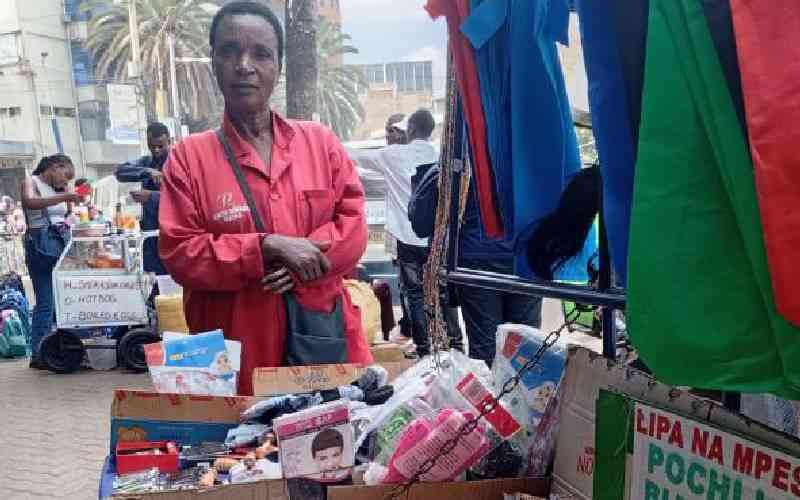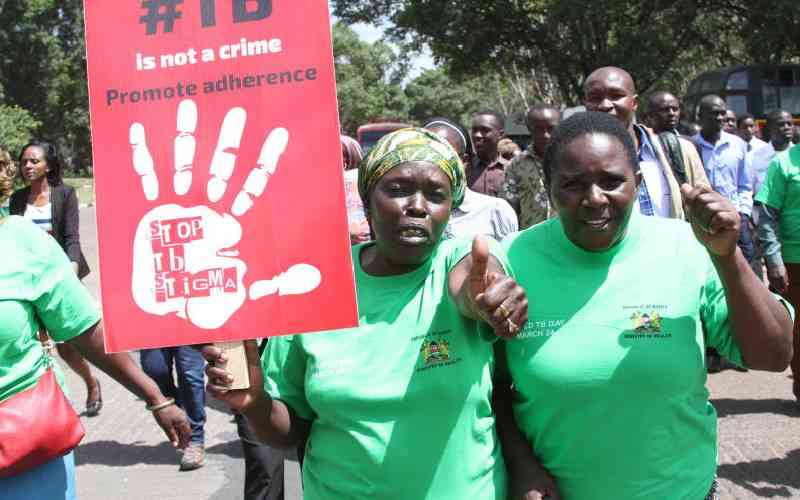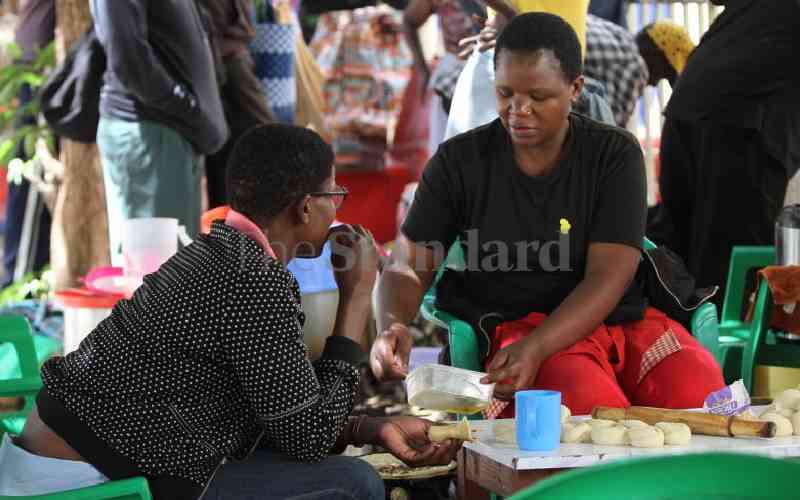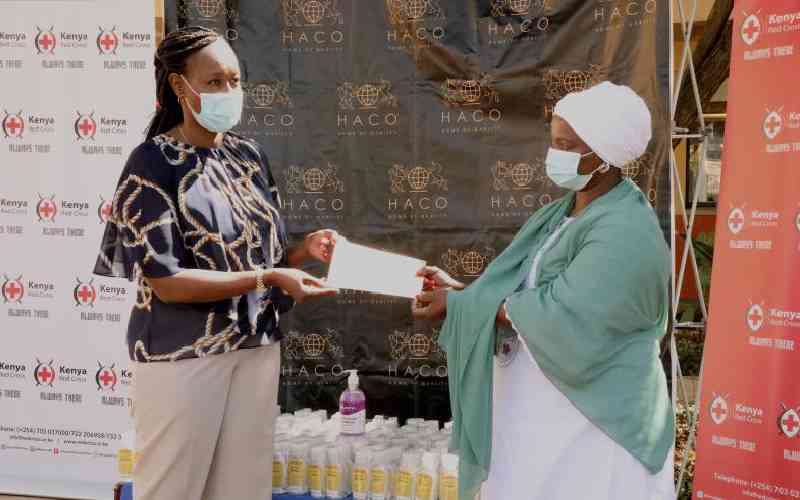
In the heart of Nairobi’s Central Business District, Hellen Awuor, 46, arranges fresh plates at her newly established eatery.
The simple act carries profound meaning – it represents a fresh start after losing nearly everything when her previous restaurant was destroyed during anti-government demonstrations earlier this year.
“When the building was burnt, I was not around to witness it,” Awuor recalls.
“I just received a call telling me it was burnt, along with most of my things there.”
A mother of three, Awuor exemplifies the resilience of Kenya’s small business owners who faced unprecedented challenges in 2024, from increased taxation to civil unrest that left a trail of destroyed businesses.
The Kenya Private Sector Alliance (Kepsa) reports that over 200 small businesses were affected by civil unrest in 2024, with many suffering significant losses.
The Gen Z protests that rocked major cities in the country resulted in property damage worth millions of shillings, fundamentally altering the business landscape in urban centres.
- Voices in the digital storm: Youth protests a cry for attention or deeper mental health crisis?
Keep Reading
The path to recovery has not been easy for Awuor. “I had to start afresh,” she says, describing a journey that took her from delivering samosas to cooking door-to-door for clients.
To sustain rent and feed her children, she worked as a house help while pursuing multiple ventures simultaneously.
Her entrepreneurial spirit led her to open an eatery in Kayole with just Sh2,000, borrowing saucepans and depleting her savings to rent the space. When that business succumbed to debts, she relocated to a place along Kangundo Road, where space was plentiful but competition fierce.
She walked the streets selling maize and delivered chapatis to office workers, determined to keep going.
The struggle was painfully familiar. “I did not want a repeat of what happened in 2020,” Awuor recalls, referring to when job loss forced her and her children into a cramped single room.
“I nearly lost my house.” Just as she thought 2024 would bring stability, the fire destroyed her business, pushing her to seek new opportunities.
A brief venture of selling tea at a Bus station ended when partnership difficulties forced her out.
Just a few streets away, along Moi Avenue, Daniel Ng’ang’a’s story presents another face of resilience. Once a proud bookshop owner on Ronald Ngala Street, he now sells jewellery from a modest display.
“The City Council (County Government) chased us from there terming the place illegally. Since then, I have never gone back,” he recalls. During the unrest, his inventory of books was burned, and a shoe-shine business he co-owned was looted and destroyed.
The challenging business environment extends beyond the direct impact of civil unrest. According to Kepsa’s latest economic survey, 37 per cent of small businesses reported difficulty in long-term planning due to frequent policy changes.
Multiple tax introductions and amendments within the year have left many entrepreneurs struggling to maintain stable operations.
Yet amidst the chaos, some entrepreneurs have found ways to innovate and adapt. In Kisumu, Daisy Oyugi’s Buzzing Bees Cleaning Services represents a different narrative of Kenya’s small business landscape.
“2024 was the year of grace, but not all rosy,” says Oyugi, who has grown her operation from a modest sofa and mattress cleaning service into a cleaning company.
What started as a modest operation offering sofa and mattress cleaning services has grown into a big cleaning company with a 14-person team, serving clients across western Kenya.
The company’s journey began with a simple brainstorming session and a Sh30,000 investment in essential equipment. “You don’t need to have it all financially to start,” Oyugi says.
“You can start with what you have then grow with what you make.” “The journey itself is a process. How much you want something will determine how far you get.”
The company’s early days were marked by limited services - just sofa and mattress cleaning - with Oyugi handling operations single-handedly. A particularly challenging post-construction job in Vihiga County served as a wake-up call.
“We thought the training was enough and we had everything figured out, but the client knew even more than we did,” she says “It took us back to the drawing board.”
Transportation remains a significant hurdle, especially with clients in remote locations.
“There was a time we spent an hour looking for directions,” Oyugi says. Safety concerns prompted the installation of security cameras, while weather dependencies for carpet drying necessitated innovative solutions.
The company has faced unexpected challenges, from discovering snakes during house cleaning to encountering rooms filled with hospital needles. These experiences led to enhanced safety protocols and proper protective equipment for the team.
High operational costs, particularly for chemicals and equipment, forced strategic pricing adjustments. “Some services like sofa cleaning were initially priced too low,” she says. “We had to re-strategise to cover our expenses while remaining competitive.”
The manufacturing sector has not been spared either. The Kenya Association of Manufacturers (KAM) reports that manufacturers have grappled with unprecedented power costs, with some firms reporting up to a 45 per cent increase in their electricity bills.
This has created additional pressure on small businesses already struggling with other operational challenges.
Buzzing Bees sets itself apart through technological innovation. The company offers indoor furniture drying regardless of weather conditions, using specialised heaters that eliminate the need for outdoor drying.
Looking ahead to 2025, they plan to introduce noise-free foggers suitable for sensitive environments like hospitals and schools.
Digital marketing has played a crucial role in their growth. “Nowadays, for any service, people look online,” Oyugi notes, crediting Facebook and Instagram advertising for bringing in new clients, though she acknowledges that traditional referrals, while slower, remain valuable.
On busy weeks, the company operates at full capacity, making roughly Sh100-200 per month, though quieter periods may see only two or three clients.
Despite these fluctuations, Oyugi remains optimistic about the future. “Even when the market is big when done right, you could thrive well in it,” she says. Her advice to aspiring entrepreneurs? “You don’t need to have it all financially to start. You can start with what you have and then grow with what you make. Just do your research and be open to learning.”
“Entrepreneurship is more fulfilling than employment,” Oyugi says. “Apart from earning directly from what you have built, it gives you the freedom to create other businesses without being so committed to one thing.”
In the streets of Nairobi’s Koja Street, Jacinta Aluoch’s determination shines brighter than her challenges. Operating a mobile snack cart with a prosthetic arm, she embodies the resilience of the city’s small business owners facing mounting economic pressures.
“The past year has cut my daily earnings by more than half,” says Aluoch. “Where I used to make Sh3,000 a day, I now struggle to reach Sh1,500.” The sharp decline in earnings comes amid rising product costs, driven by political uncertainty and intensified city council enforcement actions.
For Aluoch, her street vending business represents more than just daily income – it’s the foundation of her family’s future.
“With just one arm, I push myself every day to provide for my four children,” she explains. “This business has paid their school fees and put food on our table for years.”
Looking ahead to 2025, Aluoch yearns for the more accommodative policies of former governor Evans Kidero’s administration.
“During Kidero’s time, we had designated spaces to conduct our business peacefully,” she recalls. “We need that kind of understanding from the current county government.”
For Awuor, taking it day by day is her survival strategy. She hopes 2025 will bring success, allowing her to rejoin her chamas and expand to a larger space with more customers.
The lack of a coherent taxation policy has been especially damaging for small enterprises. Multiple tax revisions within the year have created an unstable operating environment, making it difficult for businesses to plan effectively.
Despite these challenges, both KAM and Kepsa see the potential for recovery in 2025, provided there’s improvement in policy consistency and political stability.
For entrepreneurs like Awuor, Ng’ang’a and Daisy, such improvements could mean the difference between survival and growth in the coming year.
 The Standard Group Plc is a multi-media organization with investments in media platforms spanning newspaper print
operations, television, radio broadcasting, digital and online services. The Standard Group is recognized as a
leading multi-media house in Kenya with a key influence in matters of national and international interest.
The Standard Group Plc is a multi-media organization with investments in media platforms spanning newspaper print
operations, television, radio broadcasting, digital and online services. The Standard Group is recognized as a
leading multi-media house in Kenya with a key influence in matters of national and international interest.











